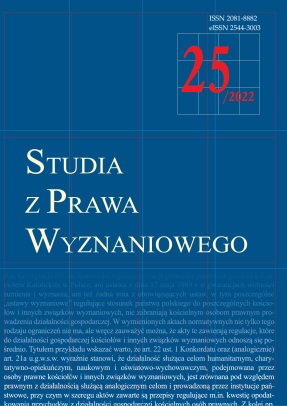Wyłączenie osoby duchownej z ryczałtu. Glosa krytyczna do wyroku Naczelnego Sądu Administracyjnego z dnia 20 kwietnia 2016 r. (II FSK 491/14)
Exclusion of a clergyman from lump-sum tax. A critical commentary on the judgement of Supreme Administrative Court of 20 April 2016 (II FSK 491/14)
Author(s): Tomasz RakoczySubject(s): Law, Constitution, Jurisprudence, Civil Law, Canon Law / Church Law
Published by: Katolicki Uniwersytet Lubelski Jana Pawła II - Wydział Prawa, Prawa Kanonicznego i Administracji
Keywords: canon law; clergyman; vow of poverty; lump-sum income tax
Summary/Abstract: As follows from the wording of art. 42 para. 1 of the Act of 20 November 1998 on the lump-sum income tax on certain revenues earned by natural persons, clergymen are subject to the tax obligation when they fulfill two conditions: performing pastoral functions (as indicated in the Act) and earning income from fees received when performing these functions. Under a strict interpretation, a clergyman who does not earn a permanent income when performing a pastoral function does not fall under the aforementioned provision and is not subject to taxation even if he does exercise a pastoral role. This is the case with members of religious institutes who have taken the vow of poverty. Canon law deprives them of the capacity to acquire goods in accordance with the principle that „whatever is acquired by a religious is acquired by the monastery”. Therefore, the judgement of the Supreme Administrative Court of 20 April 2016 (II FSK 491/14) discussed in the present paper should be assessed critically. The Court ruled that the religious vow of poverty does not deprive a religious of the right to earn a personal income but merely involves the obligation (irrelevant from the tax law perspective) to transfer the earned revenues to his religious institute. In the case under discussion, as claimed by the author, the norms of canon law should be treated as a necessary complement to the provisions of Polish law.
Journal: Studia z Prawa Wyznaniowego
- Issue Year: 2022
- Issue No: 25
- Page Range: 309-324
- Page Count: 16
- Language: Polish

